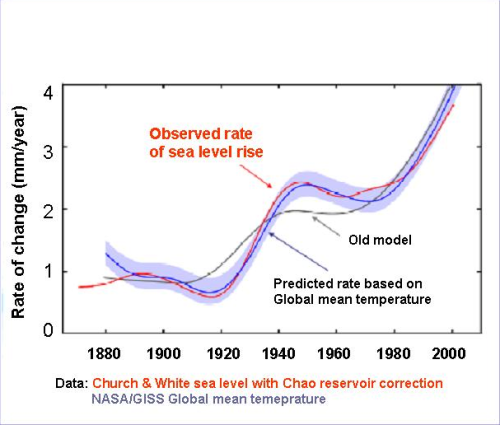“We are simply talking about the very life support system of this planet”, Professor Joachim Schellnhuber, Director, Potsdam Institute of Climate Impact, and chief climate science advisor of the German Government.
“The pace and scale of climate change may now be outstripping even the most sobering previous predictions”, United Nations Environment Programme (UNEP), Intergovernmental Panel of Climate Change (IPCC).
“The time for hesitation is over”, United Nations Secretary-General, Ban Ki-moon.
“The clock is ticking for the planet”, Kevin Rudd.
Advertisement
With the exception of rapid atmospheric changes triggered by major volcanic events, asteroid impacts and methane release, which led to the great mass extinction of species, the current rate of CO2 rise (2005-08: 1.66-2.55 ppm/year) is unprecedented in the recent history of the Earth, driving polar ice melt and sea level rise rates in excess of IPCC projections.
Warming of large parts of the Arctic and Antarctic circles by 3-4 degrees C during 1975-2009 triggers fast feedback effects from ice melt, albedo loss and open water infrared absorption, as well as from the carbon cycle.
Estimates of future sea level rise derived from 40 years records (1.6 to 3.7 mm/year), glacier flow rates and ice shelf collapse dynamics, and yet little-quantified positive feedbacks, render exponential to non-linear sea level rise on the scale of metres to tens of metres over the next decades and centuries possible.
The rise in the oceans heat content (1950-2004: 16.10^22 Joules), lowered pH (8.2 to 8.1), and enhancement of the CO3[-2] to HCO3[-] transition, threaten algae, calcifying plankton and reef habitats from shallow water to abyssal depths.
The best outcomes of the looming Copenhagen climate summit, 25 per cent carbon emission reduction relative to 1990 levels, would be unable to arrest the rise of mean global temperatures over 2 degrees Celsius relative to pre-industrial levels. The rise in CO2 emissions by 41 per cent since 1990 and continuing land clearing go counter to the urgently required measures at mitigation, massive reforestation, revegetation, application of biochar and chemical draw-down of atmospheric CO2.
Advertisement
While governments vie to vested interests and economists calculate the price of the Earth, a denial syndrome underpinned by an ideology of human mastery over nature is enhanced by a massive disinformation campaign by contrarians who ignore the basic laws of physics and chemistry and falsify climate data records.
Of all the physical and chemical indicators of climate change the rate of sea level rise is the most sensitive parameter, reflecting both thermal expansion of upper layers of the oceans and ice sheet collapse rates. The rise of sea level rates from below 1 mm/year about 1880, to about over 3.7 mm/year by 2008 (Figures 1, 2) (Rahmstorf and Vermeer, 2009), increasing rates of ice mass loss from the Greenland and Antarctic ice.

Discuss in our Forums
See what other readers are saying about this article!
Click here to read & post comments.
14 posts so far.